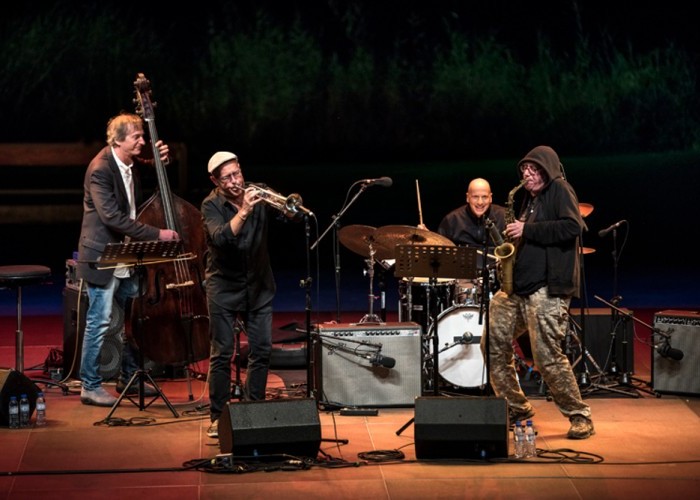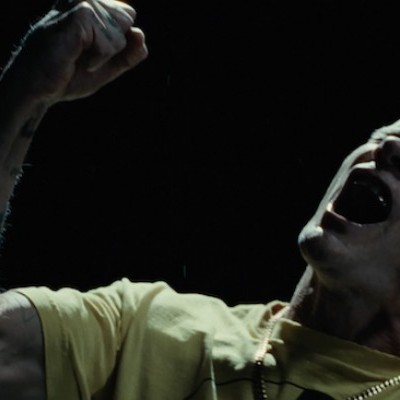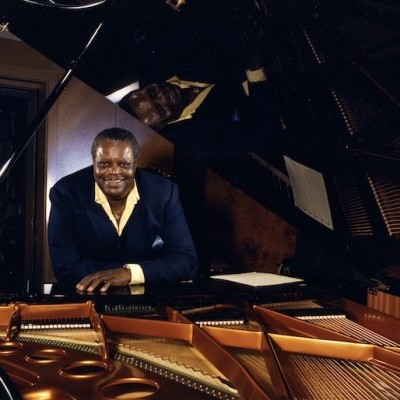Dec 9, 2025 12:28 PM
In Memoriam: Gordon Goodwin, 1954–2025
Gordon Goodwin, an award-winning saxophonist, pianist, bandleader, composer and arranger, died Dec. 8 in Los Angeles.…

Bassist Greg Cohen (from left), trumpeter Dave Douglas, drummer Joey Baron and saxophonist John Zorn perform as Masada at Jazz Em Agosto in Lisbon, Portugal.
(Photo: Petra Cvelbar/Gulbenkian Música)This annual festival in Lisbon, Portugal, long programmed by Rui Neves, consistently has offered one of Europe’s most ambitious, meticulously curated showcases for jazz experimentation on either side of the Atlantic. The decision to dedicate the 2018 installment of the event almost exclusively to the music and community of John Zorn represented not only a major break with precedent, but also a confirmation of the saxophonist and composer’s ongoing importance, influence and artistic range. A perennial New Yorker, Zorn has been organizing mini-festivals featuring disparate ensembles playing his work for quite a few years now, and the seamless flow of the double bills in Lisbon—all of the concerts occurred on various stage of the Gulbenkian Foundation—indicated that he’s got the format down to a science. But by dedicating 10 evenings to Zorn’s music through performances and video programs, Jazz em Agosto raised the stakes.
The program celebrated many phases and sides of Zorn’s work. Dither, an agile contemporary music guitar quartet from New York, performed several of his earliest game pieces—improvisational endeavors guided by sports-like rules—including “Curling” and two iterations of “Hockey.” The ensemble revealed some stiffness as improvisers, but still delivered crisp, amusing renditions of the work. An increasing part of the composer’s output has been fully notated concert music—the type of stuff that Dither specializes in. But the Lisbon program mostly steered clear of this, which makes sense considering this was ostensibly a jazz festival. One glorious exception was the European premiere of Zorn’s Jumalattarett by the extraordinary soprano Barbara Hannigan, with pianist Stephen Gosling. The work is based on the Finnish mythological text The Kalevala, where the singer expresses qualities of different goddesses from the epic as the performance progresses. Even without understanding the language, the dramatic presence, elastic range and deft precision of the singer proved riveting, with Gosling tracing the work’s ethereal shapes with elegance and power.
Not all of the music was by Zorn, though. There were improvised performances by configurations assembled by the composer, with players that he holds dear, including flutist Robert Dick. One such highlight was Highsmith Trio, an improvising project developed from a duo recording made by pianist Craig Taborn and laptop artist Ikue Mori. The musicians were pushed by the presence of drummer Jim Black, who added a tough, angular rhythmic armature at times and a coloristic presence at others. The musicians were seriously locked in, whether navigating lyric passages of gossamer delicacy or more thunderous, rumbling explosions. Two Portuguese ensembles, Slow is Possible and the Rite of Trio, played their own music on early evening concerts, where Zorn’s influence was clear. Zorn, who now prefers to compose rather than play, gave three rare performances. The fest opened with a night of improvisation modeled on programming at New York’s Stone—which he curates—after drummer Milford Graves canceled his performance in a trio with guitarist Thurston Moore due to illness. Zorn’s biting alto was the strongest presence among bassists Greg Cohen and Drew Gress, guitarists Moore, Mary Halvorson and Matt Hollenberg, and drummer Tomas Fujiwara. His turn at the organ was less convincing: a performance of his improvised The Hermetic Organ, with guest Mori, felt unfocused, probing the acoustic properties of the Grand Auditorium and the instrument, without finding a landing spot. But Zorn was at his best in a remarkably joyful set by Masada, where the rapport among Cohen, trumpeter Dave Douglas, and drummer Joey Baron was as electric as ever, and a deep-seated comfort level allowed all four musicians to range freely. The set was nothing short of euphoric.
Much of the program featured Zorn compositions from two major books of music: Masada’s Book Of Angels and the newer, still unrecorded Bagatelles. The festival offered the fascinating chance to hear how different ensembles approached the works. A quartet led by Halvorson with Gress, Fujiwara, and fellow guitarist Miles Okazaki, as well as a quartet led by pianist Kris Davis with Halvorson, Gress, and drummer Kenny Wollesen, both brought gorgeous takes on Zorn’s material, with expansive arrangements and lyric improvisation, deftly underlining and stretching the material’s generous melodic heart. The same could be said of a stunning duo performance by guitarists Gyan Riley and Julian Lage, who combined material from both Book Of Angels and Bagatelles with pieces Zorn wrote specifically for the duo on its fantastic 2017 album Midsummer Moons. The set featured intertwined lines of deceptive complexity, with dazzling melodies flowing so naturally that musicians repeatedly broke out in smiles during certain passages. Taborn gave a deeply introspective solo recital of Bagatelles pieces, while Brian Marsella’s Trio with Wollesen and bassist Trevor Dunn brought out a much different side of the music, suggesting the machinations of the Herbie Nichols trio at double time.
If any single approach dominated the 10 days of the festival, it was a prog-rock aesthetic many of the ensembles brought to Zorn’s pieces. Simulacrum—a power trio with Hollenberg, organist John Medeski, and drummer Kenny Grohowski—blazed through its set of tunes the saxophonist wrote for it, summoning the spirit of Tony Williams’ Lifetime with a metallic edge. The scrappy trio Trigger brought a punky sneer to its brutal prog sound, while Secret Chiefs 3 channeled bits of exotica, Spaghetti Westerns and surf, while tackling the composer’s Middle Eastern-tinged pieces. Somehow, despite the sprawl, the festival ultimately failed to convey the full range of Zorn’s output, while emphasizing his invaluable role as a community leader. Yet in hindsight, that’s not the fault of Jazz em Agosto: No single event seems capable of capturing the composer’s full diapason. DB

Goodwin was one of the most acclaimed, successful and influential jazz musicians of his generation.
Dec 9, 2025 12:28 PM
Gordon Goodwin, an award-winning saxophonist, pianist, bandleader, composer and arranger, died Dec. 8 in Los Angeles.…

Belá Fleck during an interview with Fredrika Whitfield on CNN.
Jan 13, 2026 2:09 PM
The fallout from the renaming of the John F. Kennedy Center for the Performing Arts to include President Donald…

Flea has returned to his first instrument — the trumpet — and assembled a dream band of jazz musicians to record a new album.
Dec 2, 2025 2:01 AM
After a nearly five-decade career as one of his generation’s defining rock bassists, Flea has returned to his first…

Dec 11, 2025 11:00 AM
DownBeat presents a complete list of the 4-, 4½- and 5-star albums from 2025 in one convenient package. It’s a great…

“It’s a pleasure and an honor to interpret the music of Oscar Peterson in his native city,” said Jim Doxas in regard to celebrating the Canadian legend. “He traveled the world, but never forgot Montreal.”
Nov 18, 2025 12:16 PM
In the pantheon of jazz luminaries, few shine as brightly, or swing as hard, as Oscar Peterson. A century ago, a…